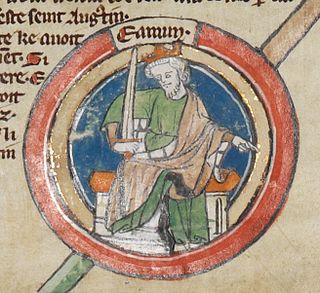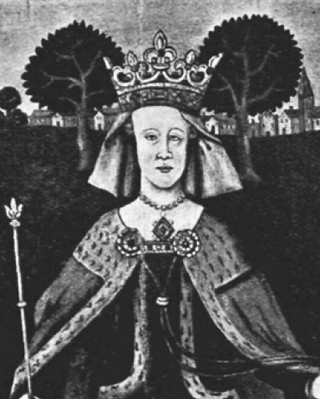The name Eadgifu, sometimes Latinized as Ediva or Edgiva, may refer to:

Edith of England, also spelt Eadgyth or Ædgyth, a member of the House of Wessex, was a German queen from 936, by her marriage to King Otto I.

Edmund I or Eadmund I was King of the English from 27 October 939 until his death. He was the elder son of King Edward the Elder and his third wife, Queen Eadgifu, and a grandson of King Alfred the Great. After Edward died in 924, he was succeeded by his eldest son, Edmund's half-brother Æthelstan. Edmund was crowned after Æthelstan died childless in 939. He had two sons, Eadwig and Edgar, by his first wife Ælfgifu, and none by his second wife Æthelflæd. His sons were young children when he was killed in a brawl with an outlaw at Pucklechurch in Gloucestershire, and he was succeeded by his younger brother Eadred, who died in 955 and was followed by Edmund's sons in succession.
Godwin of Wessex was an English nobleman who became one of the most powerful earls in England under the Danish king Cnut the Great and his successors. Cnut made Godwin the first Earl of Wessex. Godwin was the father of King Harold II and of Edith of Wessex, who in 1045 married King Edward the Confessor.

Eadred was King of the English from 26 May 946 until his death. He was the younger son of Edward the Elder and his third wife Eadgifu, and a grandson of Alfred the Great. His elder brother, Edmund, was killed trying to protect his seneschal from an attack by a violent thief. Edmund's two sons, Eadwig and Edgar, were then young children, so Eadred became king. He suffered from ill health in the last years of his life and he died at the age of a little over thirty, having never married. He was succeeded successively by his nephews, Eadwig and Edgar.

Æthelstan or Athelstan was King of the Anglo-Saxons from 924 to 927 and King of the English from 927 to his death in 939. He was the son of King Edward the Elder and his first wife, Ecgwynn. Modern historians regard him as the first King of England and one of the "greatest Anglo-Saxon kings". He never married and had no children; he was succeeded by his half-brother, Edmund I.
Ælfthryth was Queen of the English from her marriage to King Edgar in 964 or 965 until Edgar's death in 975. She was a leading figure in the regency during the minority of her son King Æthelred the Unready between 978 and 984.
The name Edburga may refer to:
Cadwallon is a Welsh name derived from the Common Brittonic *Katuwellaunos "The One Who (-mnos) Leads (welnā-) in Battle (katu-)". The same name belonged to the Catuvellauni who lived in what is now Hertfordshire, one of the most powerful British polities in the Late Iron Age who led the resistance against the Romans in 43 CE and possibly against Caesar in 55 and 54 BCE as well.

The House of Wessex, also known as the Cerdicings and the West Saxon dynasty, refers to the family, traditionally founded by Cerdic of the Gewisse, that ruled Wessex in Southern England from the early 6th century. The house became dominant in southern England after the accession of King Ecgberht in 802. Alfred the Great saved England from Viking conquest in the late ninth century and his grandson Æthelstan became first king of England in 927. The disastrous reign of Æthelred the Unready ended in Danish conquest in 1014. Æthelred and his son Edmund Ironside attempted to resist the Vikings in 1016, but after their deaths the Danish Cnut the Great and his sons ruled until 1042. The House of Wessex then briefly regained power under Æthelred's son Edward the Confessor, but lost it after the Confessor's reign, with the Norman Conquest in 1066. All kings of England since Henry II have been descended from the House of Wessex through Henry I's wife Matilda of Scotland, who was a great-granddaughter of Edmund Ironside.

Æthelwold or Æthelwald was the younger of two known sons of Æthelred I, King of Wessex from 865 to 871. Æthelwold and his brother Æthelhelm were still infants when their father the king died while fighting a Danish Viking invasion. The throne passed to the king's younger brother Alfred the Great, who carried on the war against the Vikings and won a crucial victory at the Battle of Edington in 878.

Eadgifu or Edgifu also known as Edgiva or Ogive was Queen of the West Franks as the wife of King Charles the Simple. She was a daughter of Edward the Elder, King of Wessex and England, and his second wife Ælfflæd.

Eadgifu of Kent was the third wife of Edward the Elder, King of Wessex.

Edith the Fair, also known as Edith Swanneck, was one of the wealthiest magnates in England on the eve of the Norman conquest, and may also have been the first wife of King Harold Godwinson. "Swanneck" comes from the folk etymology which made her in Old English as swann hnecca, "swan neck", which was actually most likely a corrupted form of swann hnesce, "Gentle Swan". She is sometimes confused with Ealdgyth, daughter of Earl Ælfgar of Mercia, who was queen during Harold's reign.
Sweyn Godwinson, also spelled Swein, was the eldest son of Earl Godwin of Wessex, and brother of Harold II of England.

Edward the Elder was King of the Anglo-Saxons from 899 until his death in 924. He was the elder son of Alfred the Great and his wife Ealhswith. When Edward succeeded to the throne, he had to defeat a challenge from his cousin Æthelwold, who had a strong claim to the throne as the son of Alfred's elder brother and predecessor, Æthelred I.
The name Ealdgyth (Old English: Ealdgȳð; sometimes modernized to Aldith, may refer to
Ælfflæd was the second wife of the English king Edward the Elder.

Sword of Kings is the twelfth historical novel in The Saxon Stories series by Bernard Cornwell. It was first published in October 2019.

Louis IV, called d'Outremer or Transmarinus, reigned as King of West Francia from 936 to 954. A member of the Carolingian dynasty, he was the only son of king Charles the Simple and his second wife Eadgifu of Wessex, daughter of King Edward the Elder of Wessex. His reign is mostly known thanks to the Annals of Flodoard and the later Historiae of Richerus.